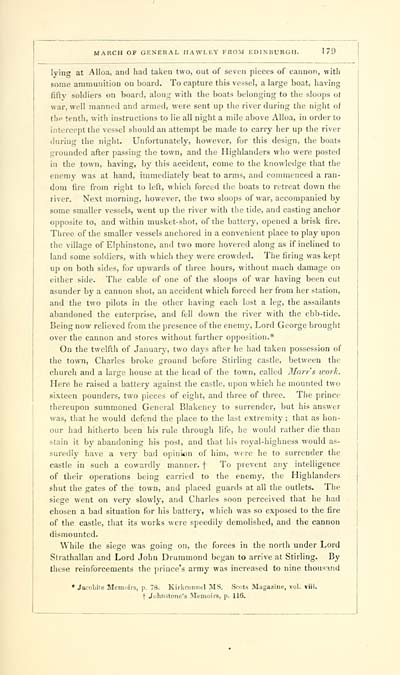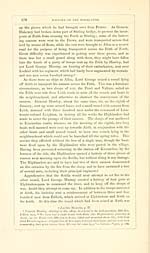Download files
Complete book:
Individual page:
Thumbnail gallery: Grid view | List view

MARCH OF GENERAL IIAWLEY FROM EDINBURGH. 179
lying at Alloa, and had taken two, out of seven pieces of cannon, with
some ammunition on board. To capture this vessel, a large boat, having
fifty soldiers on board, alonj^ with the boats belonging to the sloops ol
war, well manned and armoil, were sent up the river during the night of
the tenth, with instructions to lie all night a mile above Alloa, in order to
intercept the vessel should an attempt be made to cany her up the river
during the night. Unfortunately, however, for this design, the boats
grounded after passing the town, and the Highlanders who were posted
in the town, having, by this accident, come to the knowledge that the
enemy was at hand, immediately beat to arms, and commenced a ran-
dom fire from right to left, which forced tiie boats to retreat down the
liver. Next morning, however, the two sloops of war, accompanied by
some smaller vessels, went up the river with the tide, and casting anchor
opposite to, and within musket-shot, of the battery, opened a brisk fire.
Three of the smaller vessels anchored in a convenient place to play upon
the village of Elphinstone, and two more hovered along as if inclined to
land some soldiers, with which they were crowded. The firing was kept
up on both sides, for upwards of three hours, without much damage on
either side. The cable of one of the sloops of war having been cut
asunder by a cannon shot, an accident which forced her from her station,
and the two pilots in the other having each lost a leg, the assailants
abandoned the euterpi-ise, and fell down the river with the ebb-tide.
Being now relieved from the presence of the enemy, Lord George brought
over the cannon and stores without further opposition.*
On the twelfth of January, two days after he had taken possession of
the town, Charles broke ground before Stirling castle, between the
church and a large house at the head of the town, called Man's work.
Here he raised a battery against the castle, upon which he mounted two
sixteen pounders, two pieces of eight, and three of three. The prince
thereupon summoned General Blakeney to surrender, but his answer
was, that he would defend the place to the last extremity ; that as hon-
our had hitherto been his rule through life, he would rather die than
stain it bj' abandoning his post, and that his royal-highness would as-
suredly have a very bad opinion of him, were he to surrender the
castle in such a cowardly manner, f To prevent any intelligence
of their operations being carried to the enemy, the Highlanders
shut the gates of the town, and placed guards at all the outlets. The
siege went on very slowly, and Charles soon perceived that he had
chosen a bad situation for his battery, which was so exposed to the fire
of the castle, that its works were speedily demolished, and the cannon
dismounted.
While the siege was going on, the forces in the north under Lord
Strathallan and Lord John Drummond began to arrive at Stirling. By
Iheso reinforcements the jirince's army was increased to nine thousand
•Jacobite Memcirs, p. 78. Kirkconnel M.S. Si-nts Magazine, vol. »iii.
t Juhiistonc's Memoirs, p. 116.
lying at Alloa, and had taken two, out of seven pieces of cannon, with
some ammunition on board. To capture this vessel, a large boat, having
fifty soldiers on board, alonj^ with the boats belonging to the sloops ol
war, well manned and armoil, were sent up the river during the night of
the tenth, with instructions to lie all night a mile above Alloa, in order to
intercept the vessel should an attempt be made to cany her up the river
during the night. Unfortunately, however, for this design, the boats
grounded after passing the town, and the Highlanders who were posted
in the town, having, by this accident, come to the knowledge that the
enemy was at hand, immediately beat to arms, and commenced a ran-
dom fire from right to left, which forced tiie boats to retreat down the
liver. Next morning, however, the two sloops of war, accompanied by
some smaller vessels, went up the river with the tide, and casting anchor
opposite to, and within musket-shot, of the battery, opened a brisk fire.
Three of the smaller vessels anchored in a convenient place to play upon
the village of Elphinstone, and two more hovered along as if inclined to
land some soldiers, with which they were crowded. The firing was kept
up on both sides, for upwards of three hours, without much damage on
either side. The cable of one of the sloops of war having been cut
asunder by a cannon shot, an accident which forced her from her station,
and the two pilots in the other having each lost a leg, the assailants
abandoned the euterpi-ise, and fell down the river with the ebb-tide.
Being now relieved from the presence of the enemy, Lord George brought
over the cannon and stores without further opposition.*
On the twelfth of January, two days after he had taken possession of
the town, Charles broke ground before Stirling castle, between the
church and a large house at the head of the town, called Man's work.
Here he raised a battery against the castle, upon which he mounted two
sixteen pounders, two pieces of eight, and three of three. The prince
thereupon summoned General Blakeney to surrender, but his answer
was, that he would defend the place to the last extremity ; that as hon-
our had hitherto been his rule through life, he would rather die than
stain it bj' abandoning his post, and that his royal-highness would as-
suredly have a very bad opinion of him, were he to surrender the
castle in such a cowardly manner, f To prevent any intelligence
of their operations being carried to the enemy, the Highlanders
shut the gates of the town, and placed guards at all the outlets. The
siege went on very slowly, and Charles soon perceived that he had
chosen a bad situation for his battery, which was so exposed to the fire
of the castle, that its works were speedily demolished, and the cannon
dismounted.
While the siege was going on, the forces in the north under Lord
Strathallan and Lord John Drummond began to arrive at Stirling. By
Iheso reinforcements the jirince's army was increased to nine thousand
•Jacobite Memcirs, p. 78. Kirkconnel M.S. Si-nts Magazine, vol. »iii.
t Juhiistonc's Memoirs, p. 116.
Set display mode to: Large image | Transcription
Images and transcriptions on this page, including medium image downloads, may be used under the Creative Commons Attribution 4.0 International Licence unless otherwise stated. ![]()
| Early Gaelic Book Collections > Ossian Collection > History of the Highlands and of the Highland clans > Volume 3 > (209) |
|---|
| Permanent URL | https://digital.nls.uk/79654930 |
|---|
| Description | Vol. III. |
|---|---|
| Shelfmark | Oss.249 |
| Attribution and copyright: |
|
| Description | Selected books from the Ossian Collection of 327 volumes, originally assembled by J. Norman Methven of Perth. Different editions and translations of James MacPherson's epic poem 'Ossian', some with a map of the 'Kingdom of Connor'. Also secondary material relating to Ossianic poetry and the Ossian controversy. |
|---|
| Description | Selected items from five 'Special and Named Printed Collections'. Includes books in Gaelic and other Celtic languages, works about the Gaels, their languages, literature, culture and history. |
|---|

